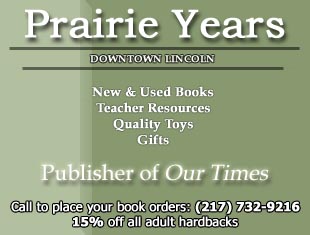
 Whether
it's a backpack, desk supplies, outfits for school, a dress for a wedding
or a car from the dealer's lot, it's fun to get new things. The August
transition from summer activities to an upcoming school year gives many of
us an extra reason to acquire the latest styles.
Whether
it's a backpack, desk supplies, outfits for school, a dress for a wedding
or a car from the dealer's lot, it's fun to get new things. The August
transition from summer activities to an upcoming school year gives many of
us an extra reason to acquire the latest styles.
A couple of
weeks ago I got in on having the latest, as two new stylebooks arrived
within a few days of each other. Actually, I got three, but one was a
duplicate, so I sent it back. I thought the mistake was funny, partly
because the book's subtitle included the phrase "the Many Things That
Can Go Wrong."
Another
mixed-up aspect was that I'd been waiting for one book order since spring,
but the book that arrived first wasn't scheduled for publication until
August. I wasn't looking for that one yet in July, much less two of them.
 I did
receive a publisherís shipment early in May, and there was a new book in
the package, but the copyright said 1998. I already had a book like that
to use. I didnít know about their change in schedule until later, but
obviously they couldnít send me something in May that wasn't printed
until June. In any case, I wanted the edition with a 2000 copyright
― the very latest.
I did
receive a publisherís shipment early in May, and there was a new book in
the package, but the copyright said 1998. I already had a book like that
to use. I didnít know about their change in schedule until later, but
obviously they couldnít send me something in May that wasn't printed
until June. In any case, I wanted the edition with a 2000 copyright
― the very latest.
I haven't
come close to mastering everything in the older stylebooks yet, but a new
book has a special appeal, and it's hard to ignore a copy with a cover
thatís almost fluorescent. With the arrival of the new books came
renewed interest in the subject matter.
I suppose
stylebooks for writing are conservative by nature, since their purpose is
to help maintain uniformity in language. People can get into impassioned
arguments about differences of opinion in such matters, but the
discussions I've read in the latest editions have been entertaining as
well as informative. For the former, there's "Lapsing Into a
Comma," by a copy editor for the Washington Post. For comprehensive
coverage, there's the official stylebook of the Associated Press.
I was happy
to see on the cover that the AP stylebook is "Fully Revised and
Updated with a new Internet Guide and Glossary." Because of the
increasing popularity of the Internet, I thought two years might make a
significant difference in what's considered standard usage for writing
about related topics. Thatís why having the latest style information was
important to me.
 Though some
of the same material was contained in the '98 edition, the special section
is a new arrangement. It includes dot-com as an informal adjective.
Another entry lists e-book, e-business and e-commerce
along with e-mail.
Though some
of the same material was contained in the '98 edition, the special section
is a new arrangement. It includes dot-com as an informal adjective.
Another entry lists e-book, e-business and e-commerce
along with e-mail.
(Public
opinion tends to remove the hyphen for the shortened form of electronic
mail, but the original question was whether or not to capitalize the e.
The choice of the hyphenated version is related to many earlier examples,
such as A-bomb, A-frame, I-beam and T-shirt.)
First-letter
capitalization is considered standard for Internet, addresses such
as Barnesandnoble.com, World Wide Web, the Web, Web
page and Web site. (One author remarks, "A web site is
where flies go to die.") Although it's popular to merge compound
nouns, neither of the newest stylebooks combines Web site or home
page. The entry for cyberspace suggests avoiding most of the
"cutesy coinages" with the same prefix.
 As no expert
in computer matters, I used to think that I should simply follow the way
the experts write their specialized terms, but there are variations from
person to person, and the usage is continually developing. Besides, most
specialties have their own jargon ― an insider language ―
which isn't necessarily how the same material is presented in standard
writing for the general public.
As no expert
in computer matters, I used to think that I should simply follow the way
the experts write their specialized terms, but there are variations from
person to person, and the usage is continually developing. Besides, most
specialties have their own jargon ― an insider language ―
which isn't necessarily how the same material is presented in standard
writing for the general public.
The opinion
of the Post's chief copy editor is that those who developed the Internet
are "brilliant people, but they're not the ones we should be looking
to for language instruction."
It will be interesting to see
how our usage changes in years to come, but for now I'll be happy with
having the new books for reference. Copyright 2000 looks to me like the
latest style.


![]()
![]()